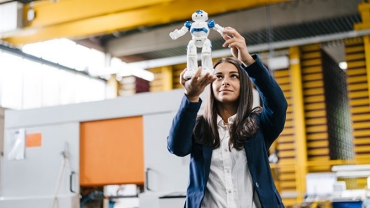
Our world of work is changing faster than ever
How we work, what our employees need from us and what we expect from them in return are being transformed. Is your organisation keeping pace?
From the acceleration in digital transformation, to mounting talent gaps and the increasing risk of employee burnout, it’s hard to think of a time when the workforce challenges facing businesses in the Channel Islands have been more significant or more complex. Tactical talent strategies built around reactive hiring and salary hikes are no longer enough.
80% of employees now prefer to support or work for companies that care about the same issues as they do, such as diversity, sustainability and social inclusion.
What comes through strongly from the survey findings is that Channel Islands businesses are ahead of the curve in understanding the impact of technology on their workforce, the need to compete for global talent and the importance of reskilling, redeployment and resilience in responding. But they’re falling behind other markets in turning intentions into actions.
In a competitive market for talent and skills, it’s important to quickly get to grips with the impact of the new world of work and make the most of your employees’ potential.
The organisations that do so, will not only have an edge in the competition for talent, but will also be well placed to move swiftly and decisively to take advantage of new and emerging opportunities.
How can you bring your workforce strategy up to speed? Drawing on the survey results and our work with businesses across the Channel Islands, this report outlines the drivers for workforce transformation and how your business can get on the front foot in response.
I would like to thank all the executives who contributed to the survey for their time and insight. If there are any issues in this report you would like to discuss or you would like to know more about how your organisation can build the workforce of the future, please get in touch.
Only 39% of Channel Islands’ organisations have identified the potential risks caused by decisions to replace human work with technology versus a global average of 65%.
“The Channel Islands have always been resilient and agile, so I’m optimistic about our ability to solve the current workforce challenges. But we need to think differently and commit to real change if we want to future-proof our workforce with relevant skills. That change starts with the leadership.”
Four biggest workforce challenges
Our survey found that Channel Islands business leaders are keenly aware of the changing world of work and the implications for their industry, their organisation and their workforce. In keeping pace, these leaders identified four equally pressing challenges they need to address:
- The need to compete in a global market for talent
- Easy access to contingent workers
- Ability to rapidly reskill
- Having the right data and systems to inform workforce decisions
75% of Channel Islands organisations believe they attract talented people by providing good work-life balance and flexibility over hours and working locations.
“A post pandemic reboot on workforce strategy is now overdue for Channel Island businesses. They understand the need to change and the consequences of doing nothing, but the time for action is now.”
Contact us














